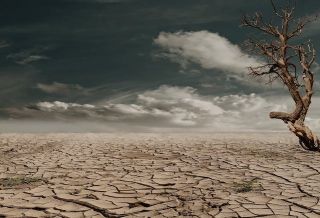Humor
Climate Change: Finding the Pony in the Poop
When it comes to eco-anxiety, economize your doom with humor.
Posted November 21, 2023 Reviewed by Ray Parker
Key points
- Conversations about climate change have been stuck for a long time.
- A new approach is needed that feels less like an apocalyptic lecture.
- Multiple recent studies confirmed the efficacy of humor in engaging the public about climate change.

Climate change has led to extreme weather events and comically large wide-brimmed sun hats. But big oil executives can't be bothered with silly things like a flammable planet and mass extinctions.
Before Instagram Filters, There Was Smog
In 2017, the American Psychological Association and ecoAmerica defined eco-anxiety as "a chronic fear of environmental doom." 1,2 Feeling anxious is a completely appropriate response to the severity of climate change. But, it can manifest in troubling ways, such as obsessive thinking, sleep problems, or panic attacks.
The only time an animal should risk death from ingesting plastic is when it eats a person with implants.
Maybe you romanticize a prior era. But each decade had its own apocalyptic flair. The '80s remain popular, but there was no internet, social media, cell phones, or comprehensive smog checks. Grown men donned mullets and wore Day-Glo parachute pants and fanny packs.
There was the Cold War and the constant threat of a Russian incursion. When people didn't fear a life of communism, they feared AIDS, which had no suitable treatment and struck horror among casual sex-goers. America had an actor for president, and racism was casually accepted. All the while, cars were eating cassette tapes in the middle of your favorite song.
Though the current era seems especially problematic, it tracks with the anxieties of prior generations going back 200,000 years. Today, we all face the existential threat of climate change while feeling not just eco-anxious but eco-angry—even eco-rage. The anger is rooted in rightful feelings that governments and corporations are abhorrent stewards of the planet, putting profits and short-term gains before this incredible orb.
Decades ago, the great conservationist Aldo Leopold wrote in A Sand County Almanac: And Sketches Here and There, "Being ecologically conscious is like living in a world of wounds." 3 Amen, sir.
Billionaires when you ask them to help with climate change: 'Best I can do is rocket some friends and me to space.'
The curious thing about the psychological threat of climate change is that it not only leads to declining mental health for those directly impacted but also for those who experience it indirectly through media, education, and even discussions with friends. We're feeling a combination of grief (at what we are losing in terms of species and ecosystems), trauma (at natural disasters already happening that you may have survived or images you've seen), and anxiety (about what could still happen). Anxiety is a contagion.
It's easy to feel like climate change is too overwhelming, thereby creating a sense of total powerlessness. Unless you stow away to Mars, you'll be left behind to fossilize with all the RVs, vape pens, and iPhones. But it's not that black and white. And it often creates a situation where a false belief exists that unless everyone takes action, then what's the point? This is a dangerous rationale that is associated with less engagement.4
Use Humor to Talk About Climate Change
Conversations about climate change have been stuck for a long time. A new approach is needed that feels less like an apocalyptic lecture. Researchers have shown that gloomily framing information disempowers people who could otherwise be moved by a shrewder approach. Research further illustrates that using humor lowers defenses and meets people where they are.5 Within a single year, three studies published in the Journal of Science Communication, Comedy Studies, and Science Communication confirmed the efficacy of humor in engaging the public about climate change.6,7,8
A vegan, cyclist, and climate change enthusiast walk into a bar:
Everyone else leaves.
It's tough to find humor after seeing Rhode Island-sized chunks of glaciers breaking off into the Southern Ocean. With emotional stakes this high, humor may seem heretical. Contrarily, it's a way to garner the attention of people not otherwise reached. Our perilously changing climate isn't funny, but laughing at our pain often leads to finding solutions.
Humor shifts perspective just long enough to appreciate that there is hope for a different outcome. Trivializing climate change with humor may also seem risky. Still, a greater risk would be for people to stop talking about the problem entirely and miss the chance to reimagine and actively plan for their collective futures.
Younger people, in particular, feel helpless, embittered, and alone with this issue when they're not terrified. And while you don't need to sail across the ocean in a wind-powered boat made of recycled milk jugs, there are small actions that you can take. And the science bears it out—taking environmental action, even small steps, seems to protect against depression.9
Despite what you might feel, you are a unilateral force in righting the wrongs of governments and corporations. In short, you don't need to flex your favorite Armageddon outfit for the' gram yet.
References
Clayton, S., Manning, C. M., Krygsman, K., & Speiser, M. (2017). Mental Health and Our Changing Climate: Impacts, Implications, and Guidance. Washington, D.C.: American Psychological Association, and ecoAmerica.
Schreiber, M. (2021, March). Addressing climate change concerns in practice. Monitor on Psychology, 52(2).
Charles, G. (2020). “A sand county Almanac and sketches here and there” by Aldo Leopold. Introduction by Barbara Kingsolver [book review]. The Canadian Field-Naturalist, 134(2), 195–196.
Hugo, N. (2022), "Children as Agents of Change for the Future", Séraphin, H. (Ed.) Children in Sustainable and Responsible Tourism, Emerald Publishing Limited, Bingley, pp. 189-199.
Nerlich, B. (2019). Book review: Maxwell Boykoff, creative (climate) communications: Productive pathways for science, policy and society. Public Understanding of Science, 29(2), 248–249.
Becker, A., & Anderson, A. A. (2019). Using humor to engage the public on climate change: The effect of exposure to one-sided vs. two-sided satire on message discounting, elaboration and counterarguing. Journal of Science Communication, 18(4), A07.
Osnes, B., Boykoff, M., & Chandler, P. (2019). Good-natured comedy to enrich climate communication. Comedy Studies, 10(2), 224–236.
Skurka, C., Niederdeppe, J., & Nabi, R. (2019). Kimmel on climate: Disentangling the emotional ingredients of a satirical monologue. Science Communication, 41(4), 394–421.
Fritze, J. G., Blashki, G. A., Burke, S., & Wiseman, J. (2008). Hope, despair and transformation: Climate change and the promotion of mental health and wellbeing. International Journal of Mental Health Systems, 2(1).




